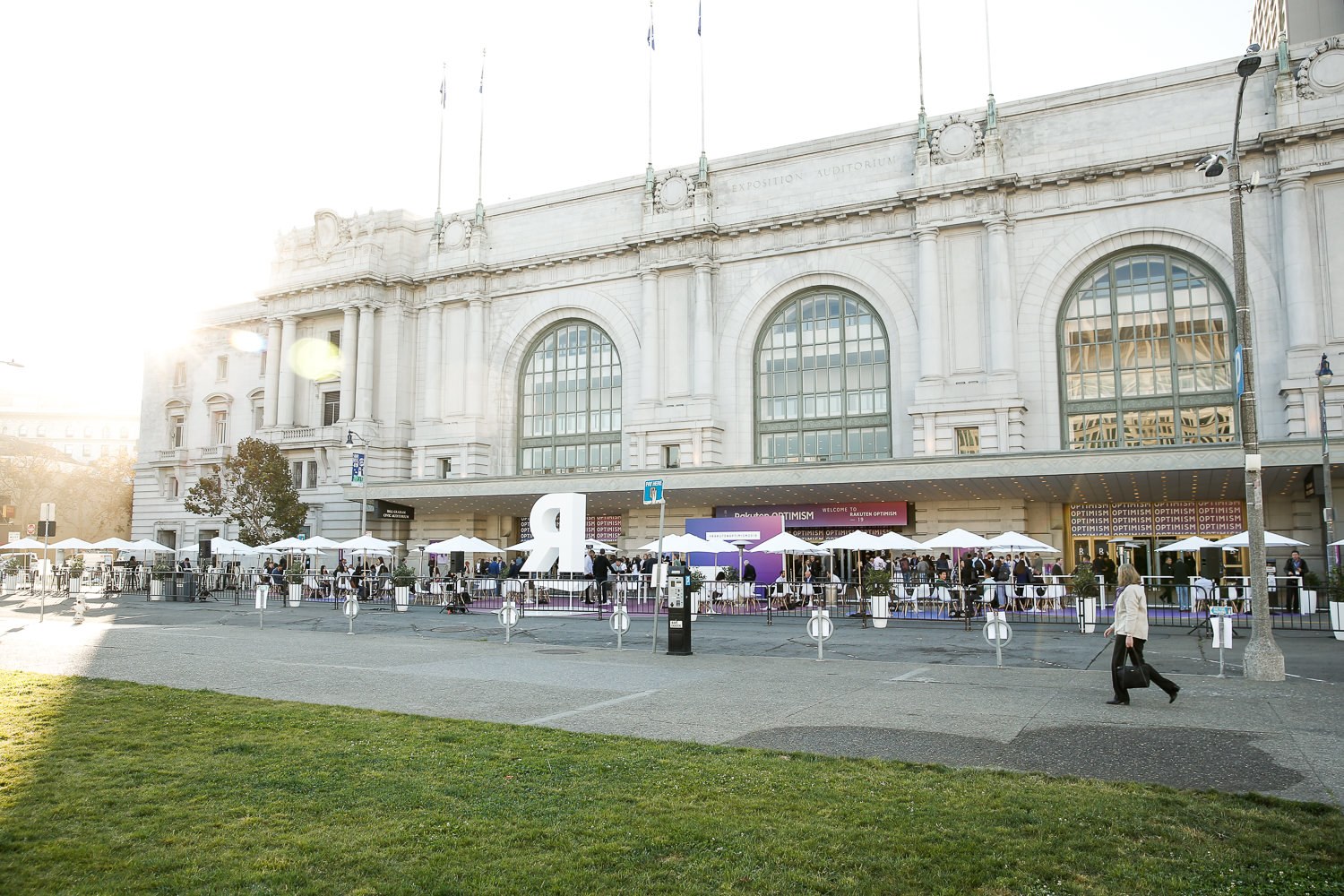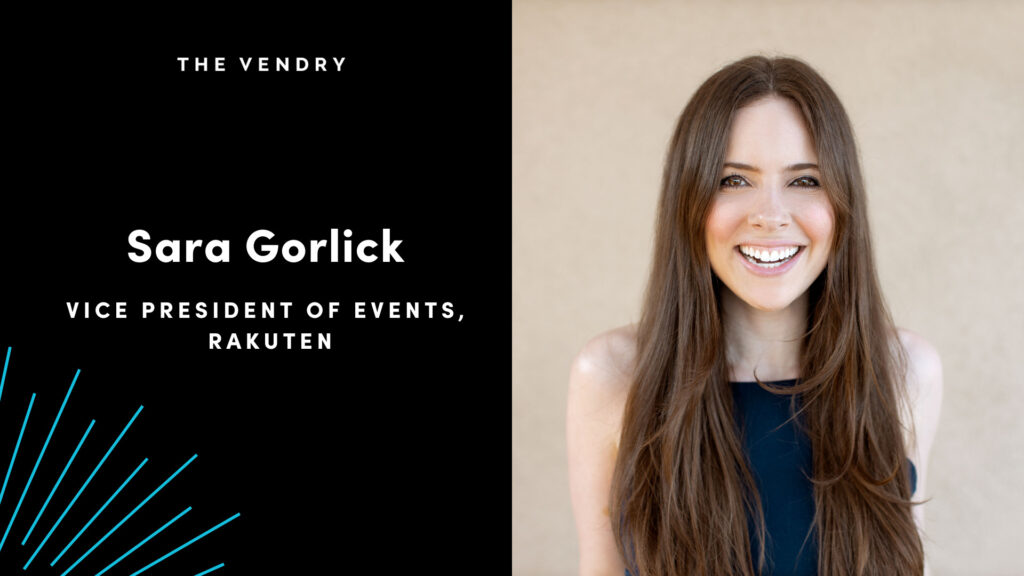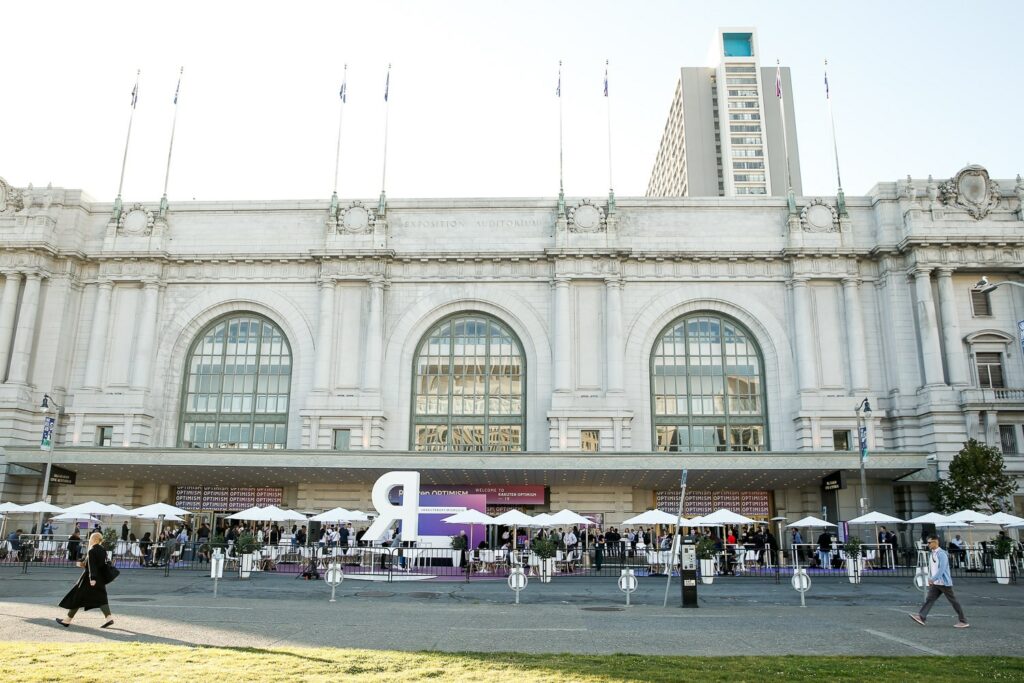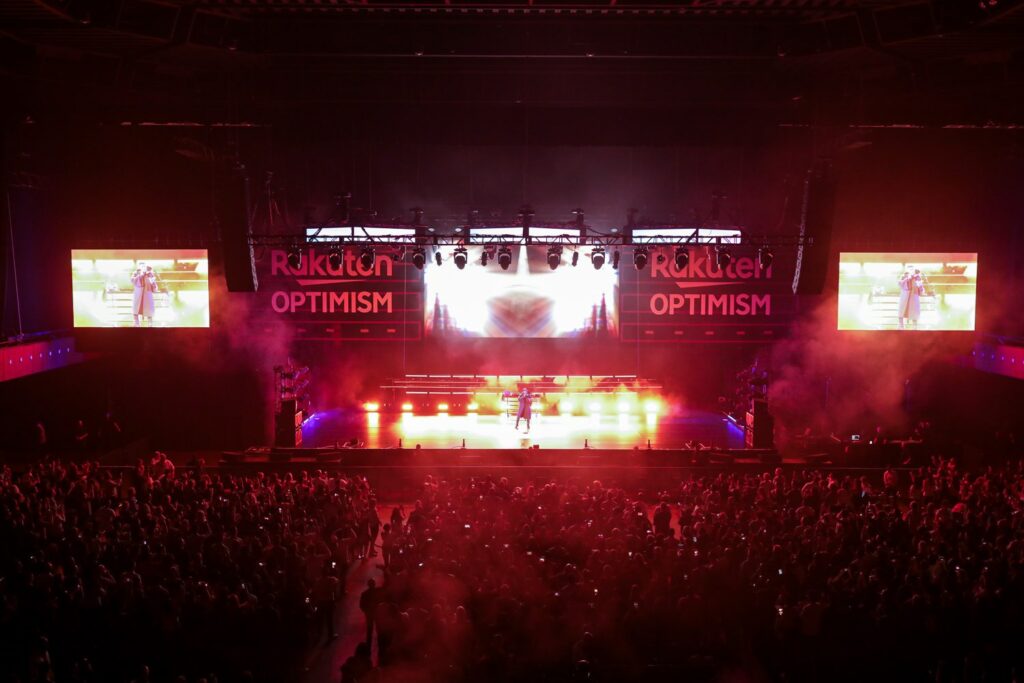
Sara Gorlick is Vice President of Events for online retail company Rakuten, where she’s been planning B-to-B events for 11 years. Prior to her current role, she conquered the hotel side of the industry, traipsing the globe for Intercontinental Hotels & Resorts. She chatted with The Vendry about what makes a great event, her “superpowers,” and why every event planner needs to learn from their failures.

I am the Head of Events for Rakuten Americas. I manage a team of a few other amazing event planners. We handle the planning for pretty much any event that is taking place in the U.S., and we work closely with the sales team on any industry events they want to participate in. Things have changed, obviously, because of COVID, so now we're planning a lot of virtual offerings. This year we'll probably execute close to 50 virtual offerings on varying scales—from small webinars to online conferences where we have a thousand people attend to boutique cooking events.
When we are holding in person events, we manage our largest annual conference, Optimism, which has a few thousand attendees. We're hoping we can get back to doing that next year. I managed global events for Rakuten for many years, and we still do some international work as well.
I would say an area that I have a ton of experience and insight into, besides general conference planning and corporate planning, is international events and keynote production, such as managing the stage. I learned a lot during my time leading our global events and stage producing our executive presentations around the world. It required me to get really familiar with audiovisual and what to do when things go wrong.
Gorlick: I always try and think about what I would want as someone going to an event, but for me the thing that I love is storytelling. Being able to plan an event where people walk away and they feel like they’ve gained something for their personal life, their personal development, is really what motivates and excites me. When TED Talks first came out, I couldn’t stop watching them. I was so into people coming to the stage and telling really creative, impactful, and succinct stories. Just the speaker and the stage. It's hard to achieve that impact—to get someone on stage and tell a story in the right way that's captivating and people relate to, so when it does happen I think it is magical.
I also think it’s important to just give the people what they want. For us, a lot of that is networking. We want attendees to network, and we know that that's what they want but we need to take it a step further such as creating a very cool environment for the networking to take place. One of the initiatives that I led about six years ago was moving one of our biggest events [DealMaker] in San Francisco to Scottsdale, Arizona. If people are networking, why wouldn’t they want to do it in a resort setting? We weren't sure if people would travel, so we tried it, and people loved it so much that we stuck with it. And within a few years, we were breaking our numbers that we had in San Francisco, where a lot of attendees were local.
Gorlick: What people have told me throughout my career is that I always seem calm on site, even when there are major issues happening. I started hearing from others at the beginning, at the start of my career, about my calm exterior. But inside, of course, I was a mess. When things went wrong, I was always thinking thoughts like this is awful, the event is a disaster. Now, as my career has progressed, I’ve been able to change my thinking to okay, this is normal and lets just figure it out. I know now that no matter how much you plan, even if you do a great job planning, things are going to go wrong. It doesn't mean you're a bad planner. That's the nature of this role.
And conflict resolution and crisis management, I would say are probably the things that people have complimented me on throughout my career.
Gorlick: I'm proud of my team for the way that they've adapted and figured out how to navigate the new event industry, how they’ve thrown themselves at understanding everything they could about putting on virtual offerings to the point where we are doing nearly 50 this year.
Forward thinking, we have our first in-person event soon. Planning this event, I have noticed how much the industry has changed and how my work life is going to change going forward. When I'm organizing events, I have folders on my computer for on-site staff, AV, signage, creative … Now there's a COVID folder. A whole new element to strategize, plan and think about.
Leading up to an event, sometimes I’ll have nightmares while I sleep like I forgot to plan the event and it's the day before or I'm lost, and I can't find my way to the venue. Two nights ago, I had an event nightmare where I got on site to our event and attendees were all refusing to wear their masks, and I didn't get their vaccine checks in time. This new work life is even intruding into my dreams!
Talking about that crisis management skill, I think, for myself, an event that I'll probably be proud of is our first one back to in person, because even if elements do not go as planned, at least we are back and we're doing it and we're figuring it out.

Gorlick: When you make people feel like they're somewhere that is a good use of their time. People's time is so precious, so making sure that people walk away, and feel like they're taking something with them professionally and personally, that they grew as a person intellectually, spiritually, motivationally, etc by attending is, I think, the special sauce in creating a great event.
Being able to set up an environment where people are networking in a way where they feel like they're having deep conversations with other people is also especially important. Having attendees walk away feeling like they made a new friend or a great professional connection that will carry on past the event. That is invaluable.
I think choosing the right setting is a key strategy. For example, bringing people to a destination where they wouldn't go on their own personal time, such as a resort. How often do people actually take vacations? To be able to take guests to a destination where they feel like, ‘I'm in a vacation setting. This is wonderful. I don't do this much in my personal life even though I want to.’ Or bringing them to a beautiful rooftop bar. Even if it's a plain setting, and then you bring in all your own decor and transform it into a unique experience. Creating these experiences results in your guests making good use of their valuable time.
Gorlick: How personable they are on the phone when I talk to them, and if it sounds like they know what they're talking about. Over the years I've been able to quickly pick up when I talk to someone if they know what they're doing or not just by talking to them and by asking certain questions and then looking at their work. They don't necessarily have to have an amazing website or an Instagram, but that helps if they do.
I have my vendors that I love that I know can help me and continue to go back to. But if I’m searching in a particular area, if I don't know anyone there, I search on The Vendry. It’s a great tool to find the vendors we need if we're in a unique city or anywhere we don’t already have established connections.

Gorlick: That's a good question. That's so dependent on the event and what I'm planning, but I never want people to feel claustrophobic. I like to have a lot of space to play with, even if it's not a lot of square footage. If a space is well laid out it gives me options of different experiences to create in various spots. Saying this reminds me of my apartment that I had in Manhattan. It was 250 square feet and my favorite place I've ever lived, it was so small, but it was so well laid out. It was perfect.
Gorlick: I went to school in Boston. I studied communications, but I didn't know what I wanted to do when I graduated. So I got an internship at a nonprofit healthcare organization called Institute for Healthcare Improvement because I was interested in healthcare. When I graduated, there was an event coordinator position [at the organization]. The pay was terrible, and I had no idea if I wanted to do events. But I was like, I'm going to take it because what else am I going to do? And when I was there, within the first month of being there, one of their event managers left. They they put me in charge of a 1,000-person conference, my second event ever.
And it was crazy. I was totally thrown into the fire. I would say it was a really unique experience. And I wasn't even sure if the event went well once it was over because I really didn't know what I was doing. But when I got back, my boss at the time told me that ‘you could make this into a career. You did an amazing job. And you can get your C.M.P., your certified meeting professional license and turn this into a lifelong career.’ It was really that mentorship that had me lock into events because she was telling me, oh, you're good at this and there's a path you can take.
That was something at 21 years old I really needed to hear. And I enjoyed it. I stayed at the non profit for two years and then I wanted to get some international experience so I found out about this program in Israel where people could apply for a job and it was just for six months. They had a job opening at the InterContinental Hotels in events and hotel banquets so it felt very serendipitous.
When I came back, I got the interview at Rakuten, and I thought this is a great career opportunity. So I went with it. And I've been at Rakuten and doing events there ever since. As I'm getting older, I realize what a fit [events are] for my personality. I love bringing people together. I love hosting and giving people an experience. Even if I'm out having drinks with friends, I always want them to keep drinking and have the best time ever. Being an event planner combines the things that I enjoy, which is organizing and providing an experience for other people.
Gorlick: There are two things. It was my first event job at IHI because of the large conferences and the company was so brilliant at bringing an organization together around events. They put on a 6,000-person conference every year and the event was super complex. We’d work from 4 a.m. to 11 at night. It was like a bootcamp for event planning. They also created an event culture that permeated the entire organization even when events weren't taking place. Onsite all staff wore “blue shirts” and there was so much pride in that. It felt like on a regular day at the office everyone still felt the identification to being a “blue shirt”.
And then the global events also prepared me because not only was it international, but we would do four events in one week and every day we'd be in a different country, so we’d do Taiwan and Malaysia and Thailand all within one week. I’d do an event, get on the plane, go to the next. And so again, that was kind of like a bootcamp.
Gorlick: I would say go all in and when you first start out embrace the administrative work, whether it's printing a ton of name badges or shipping supplies. If you get an event coordinator position, a lot of times you're going to be supporting a team. Don't think that that’s not important work because name badges are the event’s first impression—like a first date. That work is some of the most important work to making sure an event runs well. Do not feel discouraged when you’re doing that for a couple of years. That's part of setting the right foundation for your career.
Talking about crisis management, when the food runs out or the microphone doesn't work or the slides don't advance or you forgot to print a handful of name badges and guests have to wait or the registration line is long, just figure out a solution. Don't be hard on yourself because part of becoming a great event planner is learning from every failure. That's how you become a successful event planner by failing and learning. And there's no way to become a great planner until you go through all those experiences.
Gorlick: The Louvre in Paris
Gorlick: It used to be ordering Indian takeout, lying in bed and binge watching a tv show. Now that I am a mom, I don’t have that time luxury anymore so these days I decompress by having a lot of coffee!
Gorlick: If someone is upset with you, talking down to you, being stern with you, etc it is usually because they are receiving pressure from someone else, are stressed themselves, and are transferring this onto you. In other words, don’t take things personally. I think it helps, when facing others that may be patronizing, condescending or just plain mean to have empathy for them. It helps to remember to stay focused and not let all the negative voices flop around in your head.